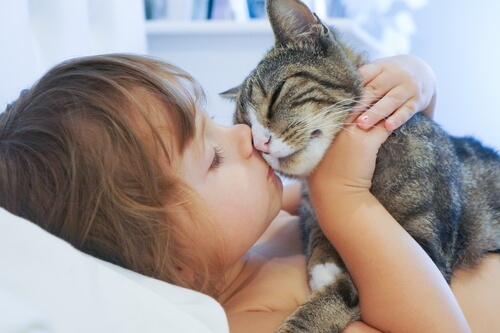Saying Goodbye to Your Pet

A pet isn’t just an animal but, over time, it becomes a member of the family. Especially with dogs and cats, but also with birds and other animals. The complicity becomes such that we know what they want just by looking at them. For this reason, pets become dear loved ones, and when they have to leave us, a grieving period occurs similar that’s to that of the loss of a family member. To keep the situation from becoming too painful, you must prepare for the time when you’ll have to say goodbye to your pet.
How can you prepare to say goodbye to your pet?
Being prepared doesn’t mean fearing every second that your pet’s going to disappear from the face of the earth at any moment. It simply means that certain animals (especially dogs and cats) live less than humans and that you should enjoy that time to the max.
At all times, you must assume the loss of the pet as something natural and part of the life cycle. Something fundamental in this preparation is to discard the feelings of guilt that usually appear in the last moments of a pet’s life, thinking that you haven’t done enough for it or that you haven’t given it due attention. These thoughts only increase your sadness and are also completely false.
What are the signs that indicate that the time’s coming to say goodby to your pet?
As with any disease, there are signs in our animals that indicate that their death is approaching. Recognizing them is a way to prepare to say goodbye to your little friend.
Typically the older the pets, the less appetite they have. In addition, their activity decreases, their panting increases, and it’s not uncommon for some type of lameness to appear. Concentrations of gray hairs may also appear in a certain way in the area of the face. The gums lose the pink color of their youth.
What if there are small children in the family?
These types of situations affect children especially, so you should pay close attention to little ones at this time. Most likely, the loss of your pet will be the first painful experience they have and it’s advisable to talk with them about it openly and making them see that you’re all sad and will miss the animal.
Above all, you have to make them see that these feelings are completely normal. In addition, it’s not advisable in any case to hide the death behind stories that the pet has gone on vacation, to a farm, or that it’s run away because this will only give the child hope that their animal may return and won’t help them overcome their loss.
Is animal euthanasia advisable?
The causes of death of domestic animals are usually accidents, illness, and old age. In the first case, there’s nothing you can do, but in the others, you may consider the option of euthanasia. This is a decision that you must make with the help of the veterinarian and when the animal’s already very sick, doesn’t eat, doesn’t sleep, barely moves, and has very intense pain. The process takes place under the supervision of a veterinarian, who guarantees that the process is completely painless for your pet. Before putting them to sleep forever, it’s highly recommended that you stay with your pet to reassure them and be calm and cheerful because your faithful companion can perfectly perceive your emotions.
How do you get through the first few days after saying goodbye to your pet?
According to psychologists, the grief that follows the loss of a pet follows the same guidelines as the grief that causes the death of a loved one. The first phase is desolation. The owner doesn’t believe that his beloved animal is no longer by their side and a sense of guilt may invade them for not having acted correctly. However, time heals everything and little by little the memories of good times will overcome the memory of death. Each person is different and experiences this process differently. However, it’s not advisable to acquire another animal immediately afterward, as you’ll only be able to compare it with the previous one.
A pet isn’t just an animal but, over time, it becomes a member of the family. Especially with dogs and cats, but also with birds and other animals. The complicity becomes such that we know what they want just by looking at them. For this reason, pets become dear loved ones, and when they have to leave us, a grieving period occurs similar that’s to that of the loss of a family member. To keep the situation from becoming too painful, you must prepare for the time when you’ll have to say goodbye to your pet.
How can you prepare to say goodbye to your pet?
Being prepared doesn’t mean fearing every second that your pet’s going to disappear from the face of the earth at any moment. It simply means that certain animals (especially dogs and cats) live less than humans and that you should enjoy that time to the max.
At all times, you must assume the loss of the pet as something natural and part of the life cycle. Something fundamental in this preparation is to discard the feelings of guilt that usually appear in the last moments of a pet’s life, thinking that you haven’t done enough for it or that you haven’t given it due attention. These thoughts only increase your sadness and are also completely false.
What are the signs that indicate that the time’s coming to say goodby to your pet?
As with any disease, there are signs in our animals that indicate that their death is approaching. Recognizing them is a way to prepare to say goodbye to your little friend.
Typically the older the pets, the less appetite they have. In addition, their activity decreases, their panting increases, and it’s not uncommon for some type of lameness to appear. Concentrations of gray hairs may also appear in a certain way in the area of the face. The gums lose the pink color of their youth.
What if there are small children in the family?
These types of situations affect children especially, so you should pay close attention to little ones at this time. Most likely, the loss of your pet will be the first painful experience they have and it’s advisable to talk with them about it openly and making them see that you’re all sad and will miss the animal.
Above all, you have to make them see that these feelings are completely normal. In addition, it’s not advisable in any case to hide the death behind stories that the pet has gone on vacation, to a farm, or that it’s run away because this will only give the child hope that their animal may return and won’t help them overcome their loss.
Is animal euthanasia advisable?
The causes of death of domestic animals are usually accidents, illness, and old age. In the first case, there’s nothing you can do, but in the others, you may consider the option of euthanasia. This is a decision that you must make with the help of the veterinarian and when the animal’s already very sick, doesn’t eat, doesn’t sleep, barely moves, and has very intense pain. The process takes place under the supervision of a veterinarian, who guarantees that the process is completely painless for your pet. Before putting them to sleep forever, it’s highly recommended that you stay with your pet to reassure them and be calm and cheerful because your faithful companion can perfectly perceive your emotions.
How do you get through the first few days after saying goodbye to your pet?
According to psychologists, the grief that follows the loss of a pet follows the same guidelines as the grief that causes the death of a loved one. The first phase is desolation. The owner doesn’t believe that his beloved animal is no longer by their side and a sense of guilt may invade them for not having acted correctly. However, time heals everything and little by little the memories of good times will overcome the memory of death. Each person is different and experiences this process differently. However, it’s not advisable to acquire another animal immediately afterward, as you’ll only be able to compare it with the previous one.
This text is provided for informational purposes only and does not replace consultation with a professional. If in doubt, consult your specialist.










